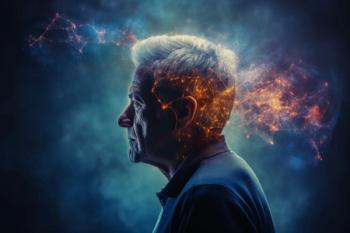
Role of Lithium In Development of Alzheimer Disease
Susan Noonan, MD, discusses emerging research on the potential role of lithium deficiency in Alzheimer disease.
In this Mental Health Minute, Susan Noonan, MD, discussed emerging research on the potential role of lithium deficiency in Alzheimer disease. She highlighted a study by Aron, et al, which examined how lithium distribution in the brain may influence cognitive decline.1
Alzheimer disease, affecting about 7.2 million Americans, is marked by memory loss, impaired cognition, and hallmark brain changes such as amyloid beta plaques and tau tangles.2 The study from Aron, et al, analyzed 27 metals in the brain and found that only lithium levels were significantly reduced in the prefrontal cortex of individuals with mild cognitive impairment and Alzheimer’s, despite normal blood lithium levels. Interestingly, lithium was found concentrated within amyloid plaques but depleted in surrounding brain tissue, suggesting reduced bioavailability where it is most needed.
Mouse studies confirmed that lithium is sequestered by amyloid deposits. Diets low in lithium accelerated plaque buildup, impaired memory, and worsened inflammation, Noonan summarized. Population data from Denmark further showed that higher lithium levels in drinking water correlated with lower dementia rates. Lithium appeared to protect against memory loss, support synaptic maintenance, and preserve myelin integrity, while deficiency contributed to inflammation and impaired amyloid clearance.
The researchers then tested lithium salts with different binding affinities. Lithium orotate, unlike lithium carbonate (commonly used in bipolar treatment), avoided sequestration, maintained brain bioavailability, and in mice, reduced Alzheimer pathology while restoring memory. While human studies are not yet completed, the findings suggest lithium’s critical role in brain aging and raise the possibility that low-dose lithium could help delay or prevent Alzheimer disease.
Dr Noonan is a physician, mental health and wellness coach; author of 5 books on managing mental health and mood disorders with a print and video blog; consultant; group facilitator; and certified peer specialist. Dr Noonan is the inaugural recipient of the National Depression and Bipolar Support Alliance Peer Support Specialist of the Year 2022. Her most recent book, published by Johns Hopkins University Press, is Reconnecting After Isolation: Coping With Anxiety, Depression, Grief, PTSD, and More
References
1. Aron L, Ngian ZK, Qiu C, et al.
2. Raskin J, Cummings J, Hardy J, et al.
Newsletter
Receive trusted psychiatric news, expert analysis, and clinical insights — subscribe today to support your practice and your patients.







